Rust Tips For Beginners: 9 Strategies To Help Survive The First Few Nights
Rust can be a difficult game to start out in, so we compiled a list of tips to help beginners get on the right track.
When venturing into any new survival-crafting game, players will need as many tips as possible to survive their first night, let alone any additional time spent in the wilderness. Rust is one such game that is particularly brutal on newcomers, as there's not an abundance of helpful hints waiting for players when they step into a server. While some other players on a specific server could be willing to lend a helping hand, more often than not those players will be preying on newcomers for an easy kill. If you want to enjoy your first few hours in Rust, then you've come to the right place. We've compiled a list of beginner tips to get you off on the right foot when beginning this popular, yet demanding survival title.
Rust has been around since 2013 on PC but recently came to last- and current-gen consoles. Whether you're a player getting into the well-established PC scene or a newcomer on the console side of things, we have you covered with some essential tips to survive your first few days and nights.
1. Choose the right server

For the most part, Rust operates on an online multiplayer-only basis. While players can manipulate the files to make their own private server and play solo or offline, a majority of players won't venture into that rabbit hole. So, for most players, choosing a server will be one of the first things to do when starting up Rust for the first time. There are a few different kinds of servers in Rust, which are displayed on the lefthand side of the server list. There are Official, Community, and Modded servers, all of which have their benefits and detriments.
The Official list might be where players initially want to search, but this can be a mistake. Since these servers have been around for so long, many of them are chock-full of experienced players who might not be so kind to new players. Instead, players might want to search in the Community tab. This is where members of the community have created servers for various purposes. In this tab, there is a search bar at the bottom of the screen. You can search for any tag and a list of servers will pop up accordingly. So you can type in tags like "beginner" to get the best starting servers. Of course, if you want a trial by fire, then going with a hardcore or Official server could be the way to go.
2. Gather wood as quickly as possible
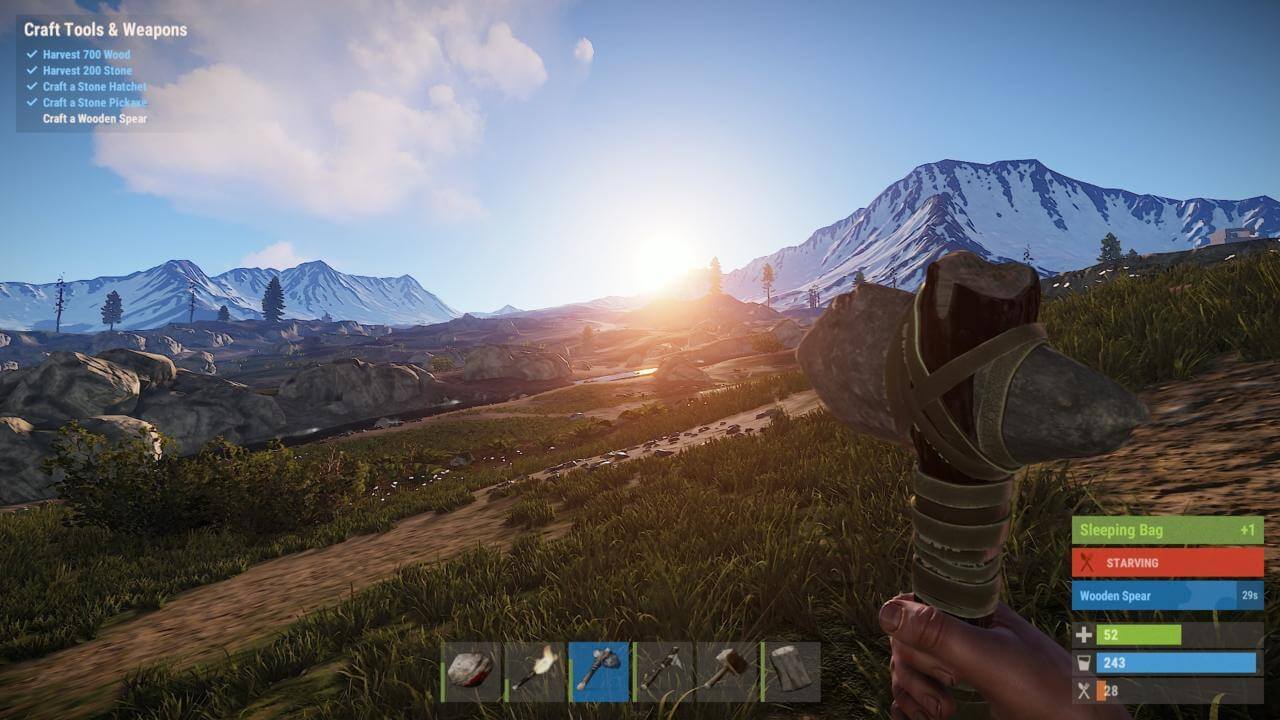
Wood is one of the most important early-game resources you can gather in Rust. It's the only material you will need to build your first starter base and is also needed to build items like a storage box and campfire. To gather wood, you'll first need a simple item like a rock. Even this primitive item will allow you to hit a tree in order to get a modest amount of wood. Once you have 100 wood, and 75 metal fragments, you can craft a hatchet, which will increase your wood-gathering speed.
As you progress in Rust, you'll find that different trees drop more wood and stronger hatchets yield a higher number of wood planks each time you chop down a tree. For newcomers, though, just use a rock or hatchet and knock down as many trees as you can until you have enough to build a base.
3. Pick a safe spot for your base

The number one thing that might deter a newcomer from playing Rust further is if their base gets ransacked by another player. Even if players picked a beginner-friendly or PvE server, their base can still get robbed. For this reason, players want to ensure they pick an out-of-the-way spot for their first base. This will allow them to get started with a modest amount of resources and learn the basics of building a base. Once you have a few hours in Rust and understand the mechanics of the game a little better, you can move your base somewhere else.
If you're trying to find a safe spot, we recommend somewhere deep in the forest. This provides you with plenty of cover and puts you right near a plethora of materials you can easily gather just by walking outside of your door. If you want to go a step further, you can build your base in a forest near an abandoned town so you can be near even more resources. There are dozens of helpful YouTube videos for players looking at how to design their first base, as well.
4. Craft a sleeping bag ASAP

If by some chance you happen to get killed during your first few hours in Rust, you want to ensure you have a sleeping bag already crafted. A sleeping bag, once slept in, creates a respawn point for you upon your death. Whether you die from natural causes or at the hands of an enemy player, if you don't have a sleeping bag, then you'll respawn way back at the beach. If you chose to build your base in the dense forest away from the beach, then it could be a long trek back to salvation.
In order to craft a sleeping bag, you'll need 30 cloth. This resource is easily gathered from hemp bushes, which can be found all over the starting areas of Rust. They look like small green Christmas trees on the ground. Players only need to find three of them to have enough cloth for a sleeping bag.
5. Don't illuminate yourself at night
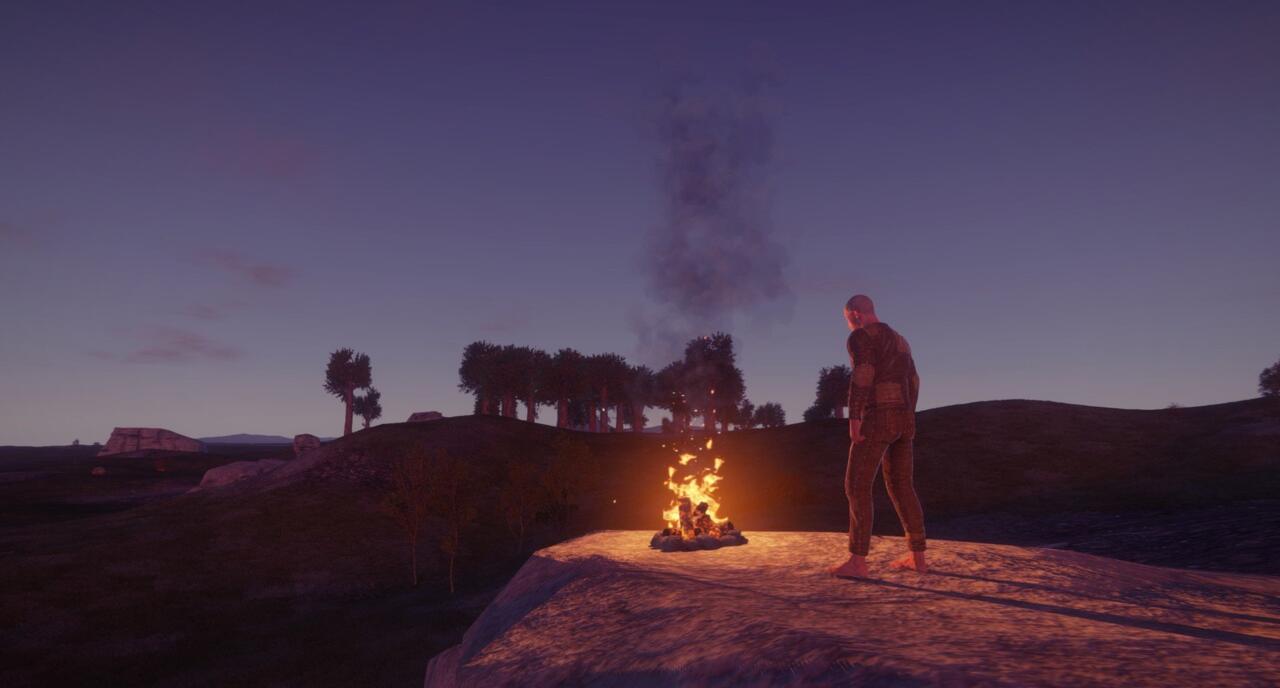
While it might seem tempting to light up the world around you with a torch or a campfire at night, it's best to avoid that altogether. Though it might be difficult to see at times, lighting a fire of any kind makes you an immediate target for enemy players out in the world. If you're playing on a beginner server, then you might be able to get away with lighting a secluded campfire outside your base. However, it's always going to be a risky endeavor. In most situations, you want to try and avoid lighting yourself up in order to keep you and your base safe. The only outlier situations might be if you're forced to cook or build at nighttime.
6. Gather resources efficiently
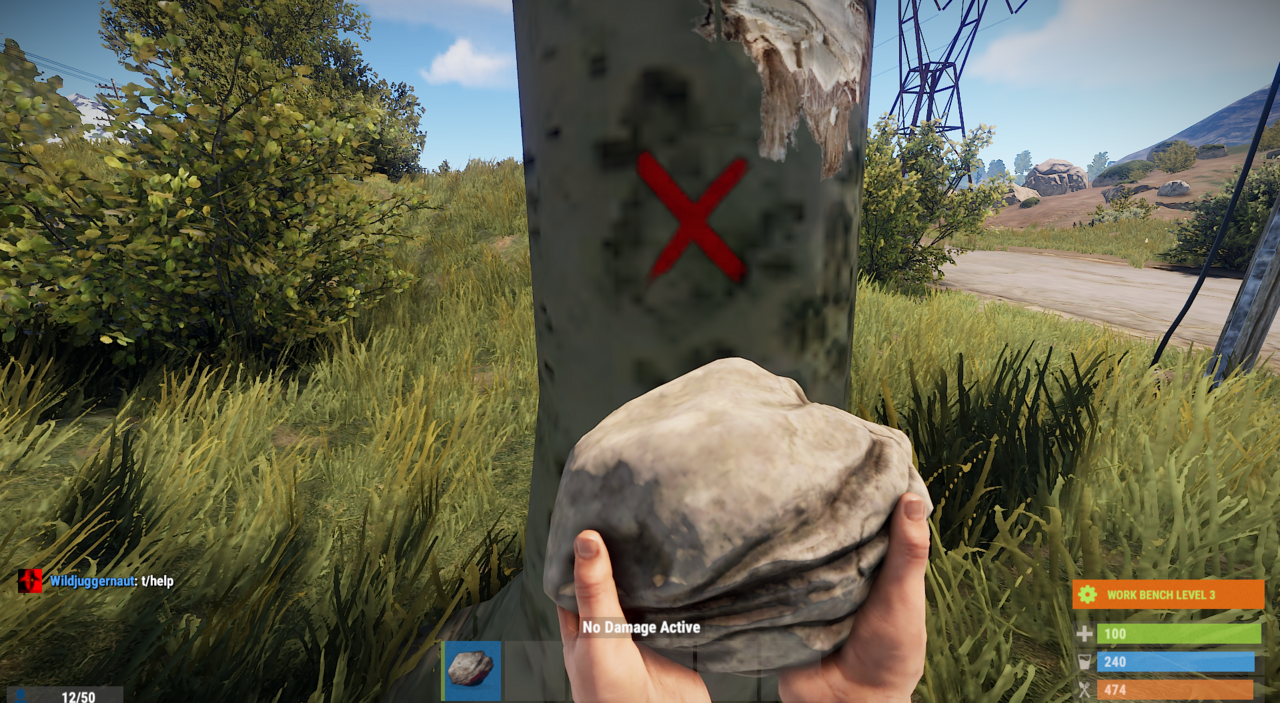
An easy mechanic to overlook in Rust is how to gather your resources. If you're hitting a tree or rock, make sure you aim for the red X that appears in various spots on a tree and the light twinkle that appears on rocks. By hitting this red X/twinkle, you will gather the resource much faster than if you were to just aim anywhere. This mechanic becomes moot once you make a hatchet or pickaxe but in the first few hours of Rust when you just have a rock, aiming for that sweet spot can save a ton of time.
7. Maintain your base

One crucial feature that most players initially don't even know exists in Rust is base decay. Slowly over your time, your base's structures will decay and eventually crumble to the ground if you don't perform upkeep management. To access the upkeep management tab, you need to build a tool cupboard and place it inside of your base. This requires 1,000 pieces of wood to build. With the cupboard in place, interact with it and read the description of upkeep management.
Essentially, you need to keep placing the right amount of resources inside the cupboard to ensure your base doesn't fall apart. With a starter base, the resource requirements won't be high at all. However, as you expand, you're going to need more and more resources to maintain your base.
8. Only gather the materials you need

Perhaps the most important tip on this list is to not over-farm resources. Though it might seem like the best thing to do, as it is in other survival games like Minecraft or Valheim, over-farming in Rust can lead to you being a target of other players on the server. Of course, this might not apply to those who choose to play on beginner servers or servers with few players on them. In most cases, though, if you have an abundance of materials in your base or in your character inventory, you can set yourself up for disappointment down the road if you die or if you're ransacked.
This tip becomes irrelevant once you get some proper defenses in place, however. At the start of the game, though, you don't want to gather more than you think you will need to get set up with a base and some additional constructions.
9. Protect your valuables
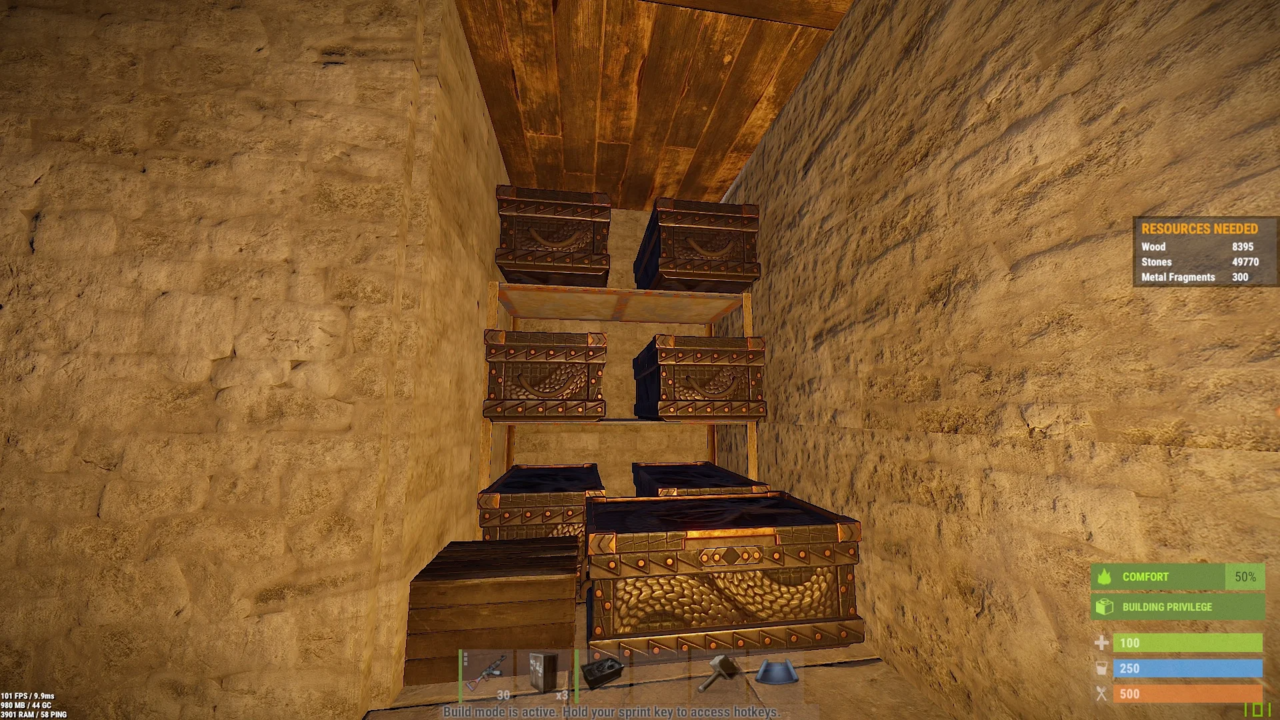
Speaking of protection, this brings us to the final tip on this list. Whenever you do start to progress in Rust and build a bigger base with more resources invested, you'll want to start protecting your items. The best way to do this in the early game is to craft two separate rooms with all of your resources and other items inside of the second room. You can construct something like this by putting two locked doors on both ends of one room and then making another room beyond one of the locked doors. This is called a "loot room." Essentially, you want to make it as difficult as possible for thieving players to get at your valuables.
Placing two rooms, both with locked doors, in your base, will prolong the process of a player trying to steal your items. There are much better ways to protect your base as you progress in Rust but a simple solution like this is best for early-game players who don't have as many resources to burn.
Those are our nine tips for surviving the early game of Rust. Hopefully, with enough luck, these tips will allow you to avoid enemies and keep all of your items without much hassle.
Got a news tip or want to contact us directly? Email news@gamespot.com


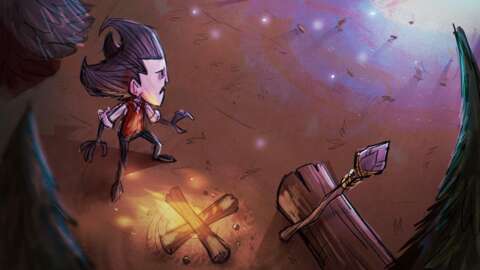




Join the conversation